New Kremlin Anti-Media Bill Threatens Social Media Freedoms In Russia

On Wednesday, Russian deputy and head of the Duma committee for Information Politics Leonid Levin announced a new bill that would give authorities new powers to persecute journalists in Russia. If passed, the legislation will introduce hefty fines for “physical or Russian legal persons that share news and material created by foreign media outlets which operate as foreign agents”.
Legal entities face fines of up to $78,000, and individuals charged could have to pay out as much as $1,560.
The new bill should be seen as an extension of existing “foreign agent” legislation that targets media outlets and NGOs operating in Russia which receive funding from abroad. In November, one of Russia’s longest-serving NGOs “For Human Rights” and another NGO specialising in indigenous peoples’ rights were ordered to close for allegedly violating foreign agent law.
There are already nine publishers that have been designated “foreign agent” status. However, the new legislation will create an array of new and challenging conditions to which “foreign agent” news outlets will have to adhere.
What’s new?
Any news outlet that receives money from sources outside of Russia are now at increased risk of being deemed a “foreign agent”. The BBC Russian service and Meduza could, for example, be added to the blacklist.
The legislation stipulates that “foreign agents” must create Russian legal entities and inform the ministry of justice and the federal communications watchdog about them. Future articles will have to published through these new entities.
Perhaps most critically, all publications made through these entities will have to contain a marker denoting that they originated from a “foreign agent”. News outlets quoting stories published initially by blacklisted outlets will also have to publish the marker. This will be the case for print, TV, radio, digital and, probably, social media publications.
The implications of these conditions is best demonstrated by a hypothetical example. Let’s fast-forward three months: BBC Russian Service has been blacklisted and has established its Kremlin-sanctioned publishing entity. One of its reporters uncovers that a high-ranking official was profiting from a small-scale embezzlement scheme in St Petersburg. The news is picked up by local bloggers who turn the story viral. Then, in response to the blogs, normal folk begin posting on Facebook, Twitter or Vkontakte, expressing their distaste at the official’s conduct. Now according to the new legislation, each one of these posts should contain a note that this story was broken by a “foreign agent”, i.e. the BBC Russian Service. Failure to do so could land the authors in hot water. This would render a huge number of people in Russia “foreign agents”.
In addition to the clear logical fallacy here —that numerous concerned Russian citizens have become “agents” of foreign states because of a Facebook post they made — implementing the new bill presents to the Kremlin another challenge. According to the legislation, the Russian communications watchdog would block all posts (without markers) containing the news and probably the accounts responsible for them, as well. Yet, will social media sites enforce the requests to block? If they do, does that make them complicit in violating freedom of speech? If they don’t, does the Kremlin simply block the sites as a whole, following the Chinese approach? Only time will tell.
Who’s going to pay?
Another crucial aspect of the bill is that it is no longer just Russian legal entities that have to bear the brunt of the Kremlin’s financial harassment. Now journalists themselves are liable for prosecution as “foreign agents”. This marks a radical shift in Russian authorities’ approach to restricting freedom of speech.
In January 2019, Anastasia Shevchenko became the first person ever in Russia to be criminally charged under “undesirable organisation” legislation. Much like with the bill proposed on Wednesday, Anastasia’s arrest represented an authoritarian pivot from authorities.
If the Kremlin has repeatedly showed its commitment to increasing, rather than reducing, pressure on dissident voices, then this new bill needs to be understood as a dangerous new legal platform for continuing this process.
First, dozens, if not hundreds, of Russian journalists are now liable for prosecution. Anyone working for the nine news outlets recognised as “foreign agents” by the Russian ministry of justice could be forced to pay thousands of dollars simply for doing their job. This could also be extended to freelancers who occasionally publish work through these outlets.
Second, the legislation also enables those who simply share content from “foreign agents” to be prosecuted. This could potentially lead to thousands of fines. Social media posts are easy picking grounds for authorities. Several people have already received multiyear sentences for posts they made on Twitter and Vkontakte. This new bill provides scope for further online persecution.
Finally, liability for prosecution could be extended to thousands of other Russian journalists. Any Russian media outlet could be designated a “foreign agent”. All this requires is a request from the Russia’s prosecutor general, Yuri Chaika. The decision to add a person or entity to the blacklist is not made by a judge and no evidence must be provided to justify the decision. In short, this bill, now on its second reading in the Duma, could massively restrict the work of journalists in Russia.



